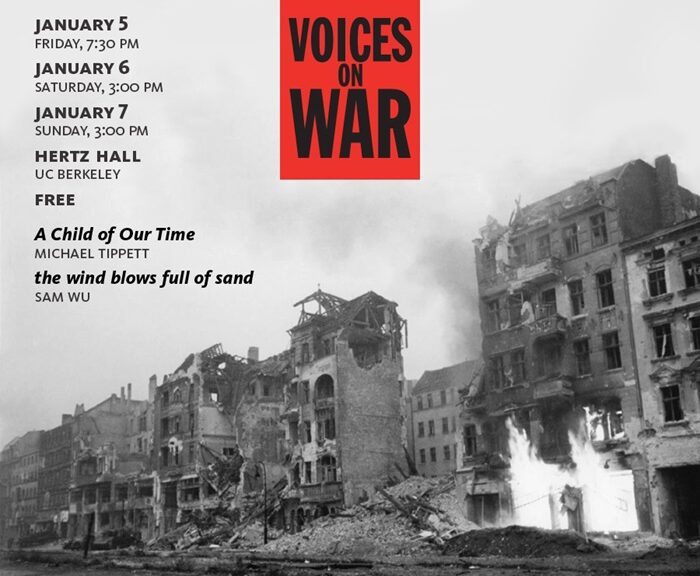
MUSIC INSPIRED BY WARTIME
BERKELEY—-Enterprising local forces brought together a far-reaching program of “Voices of War,” including a trudging Tippett oratorio and a world premiere by the Australian Sam Wu. The ambitious concert under Ming Luke spotlighted the Berkeley Community Chorus and Orchestra, with more than 100 (off-campus) singers and a full instrumental ensemble.
The highlight was BCCO competition winner Wu’s “the wind blows full of sand,” a sensitive 12-minute outpouring with poetry of Li Po. If the latter sounds familiar, the eighth-century Chinese poet was also invoked in Gustav Mahler’s music—there, in German, here in English translation as “reenvisioned” by Ezra Pound nearly a century ago. His poem reflected a strong anti-war bias, decrying the “flaming imperial anger…(of) barbarous kings,” then turning to profound sorrow over outcomes, leaving “desolate fields”—all created insightfully long before the world wars, before even the birth of Western instrumental music as we know it.
The chorus reflects sensitively on the scene, with cadential repeats, and overwhelming lyricism. Wu’s orchestra with Luke at his best flashed aflame upon the arrival of “the (warring) army with drums,” punctuated by the chorus’ shouts, reverting again to the placidity of Li Po’s lament, with serene jumps of minor thirds.
The last and long 67 minutes of the Jan. 5 program were devoted to “A Child of Our Time” by the English composer Michael Tippett (1905-1998). Had it not been for the four vocal soloists, this trudging oratorio might have put every one to sleep. Tippett’s format was modeled after Handel’s ”Messiah,” with two salient differences: A clumsy consonant-ballasted text written by himself—-a mistake he repeated in his best-known opera “Midsummer Marriage”—and a lack of memorable melodiousness. The only memorable musical line comes in a quoted American spiritual, “Deep River,” while in text, Tippett’s effort called out loudly for some vowel-rich librettist like Handel’s Jennings.
Ringing the rafters of Hertz Hall was the bracing vocal-soloist quartet, which would be a credit even to a professional ensemble’s ventures. It included, from the top, Brandie Sutton, Sara Couden, Jonathan Elmore and Kirk Eichelberger.
The concert had opened with Edward Elgar’s brief “Sospiri” (Sighs) for string orchestra, much of it rendered on the lowest string (G) of the expressive violins, with elegant support from harpist Kristin Lloyd.
MUSIC NOTES—The Tang dynasty poet Li Po might well be promoted today as patron sage of the California wineries. He drank wines heavily, convinced that it powered his inspiration…. Veteran BCCO oboist Robin May recalled that one of Tippett’s rare ventures to America included visiting the Oakland Symphony in 1980, when his American friend and much lamented maestro Calvin Simmons (one of the few Black music directors of that era) conducted the Symphony No. 2 in the Oakland Auditorium Theater…If the chorus sounded marginally fuzzy, it was from all the singers wearing masks, remembering the toll that the four-year pandemic had taken on all of our choral groups. Better safe than sorry.
VOICES OF WAR, with Tippett, Elgar, and competition winner Wu, performed by the Berkeley Community Chorus and Orchestra under Ming Luke, heard Jan. 5 at Hertz Hall. For info: go online to www.bcco.org.